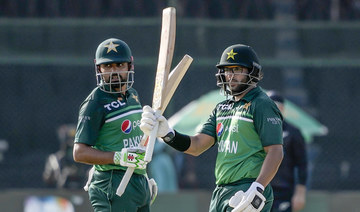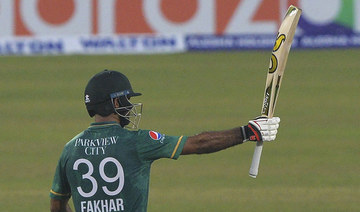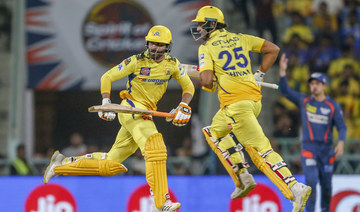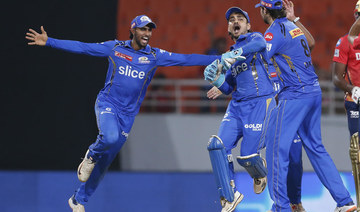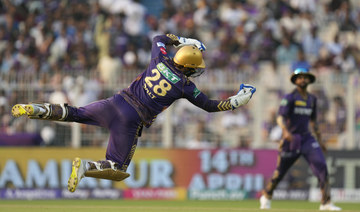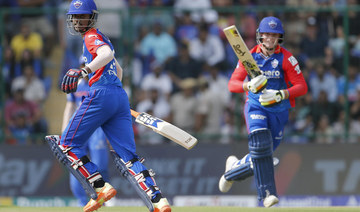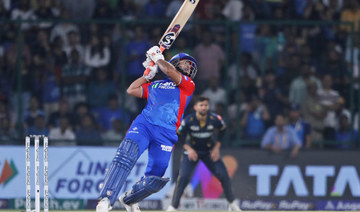KARACHI, Pakistan: Pakistan top-order batters continued to prosper as they beat under-strength New Zealand by 26 runs in the third one-day international on Wednesday for an unassailable 3-0 lead in the five-match series.
Opening batter Imam-ul-Haq made 90 off 107 balls and captain Babar Azam scored 54 as the home team raised a total of 287-6 after losing the toss and being asked to bat first.
Cole McConchie’s (64 not out) late counter-attack saw the 31-year-old smash New Zealand’s fastest half-century on ODI debut off 36 balls before the Kiwis were bowled out for 261 in the final over.
New Zealand made a solid start in a bid to keep the series alive when Tom Blundell (65), playing his first game of the series, and Will Young (33) put on 83 runs for the opening-wicket stand. But Young’s run-out in the 16th over saw the middle-order stifled by Pakistan spinners Shadab Khan and Mohammad Nawaz before Blundell too got run out while going for a second run with captain Tom Latham.
Daryl Mitchell, who scored centuries in the first two games, had two lucky escapes before he holed out in the deep after scoring 21 and Mark Chapman, who was the star for New Zealand in the preceding 2-2 drawn T20 series against Pakistan, was clean bowled by Naseem Shah for 13.
Left-arm spinner Nawaz, who dried up runs in the middle overs, injured his left index finger when he tried to hold onto a return catch of Mitchell and was brought to the hospital.
Part-time off-spinner Agha Salman made up for Nawaz’s absence, taking 1-42 off his nine overs as spinners got plenty of assistance off the wicket at the National Stadium.
Fast bowler Mohammad Wasim (2-50), one of the three changes Pakistan made from the last game, had Latham clean bowled as the Black Caps skipper attempted a ramp shot while exposing his stumps.
McConchie struggled against the spinners before taking charge in the final 10 overs against the pace as he smashed two sixes and six boundaries and brought up his half-century with a big six over mid-wicket against Shaheen Shah Afridi (2-53).
Earlier, Imam and Babar combined in a 108-run second wicket stand after Fakhar Zaman fell to Matt Henry (3-54). Fakhar’s two back-to-back centuries had earned Pakistan convincing wins at Rawalpindi before he played across the line and skied a catch to wicketkeeper Blundell.
Henry also broke the century-stand when Babar, who hit his eighth score of 50-plus in the last 11 ODIs, played the fast bowler back onto his stumps while going for an off drive. Imam showed plenty of patience but also fell in similar fashion when Adam Milne (2-56) struck in his return spell and Pakistan lost momentum in the death overs.
Mohammad Rizwan made 32 off 34 balls before he got caught by McConchie off Milne’s full toss before Shadab Khan’s hit a little cameo of 21 off 10 balls and provided a perfect finish by hitting Henry for a six off the final ball.
Karachi will host the remaining ODIs on Friday and Sunday as New Zealand wraps up its white-ball tour.
Pakistan beats New Zealand in 3rd ODI, clinches series
https://arab.news/yekjh
Pakistan beats New Zealand in 3rd ODI, clinches series
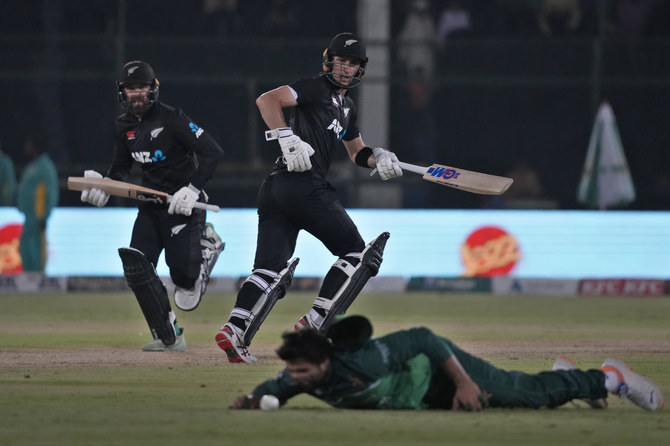
- Opening batter Imam-ul-Haq made 90 off 107 balls and captain Babar Azam scored 54
- Cole McConchie’s (64 not out) late counter-attack saw the 31-year-old smash New Zealand’s fastest half-century on ODI debut off 36 balls
All-round Stoinis helps Lucknow beat Mumbai in IPL
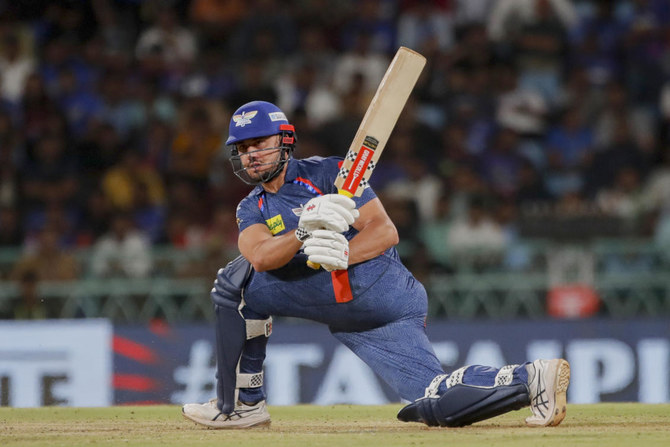
- Stoinis top-scored in Lucknow’s modest chase of 145 against Mumbai Indians as the home team achieved their target with four wickets and four balls to spare
- Mumbai managed 144-7 courtesy Nehal Wadhera’s 46 and an unbeaten 18-ball 35 by Tim David after being invited to bat first
LUCKNOW: All-rounder Marcus Stoinis smashed 62 after he took a wicket on Tuesday to guide Lucknow Super Giants to an IPL win on the eve of Australia’s T20 World Cup team announcement.
Stoinis top-scored in Lucknow’s modest chase of 145 against Mumbai Indians as the home team achieved their target with four wickets and four balls to spare.
Lucknow moved to third spot in the 10-team table led by Rajasthan Royals. Five-time winners Mumbai remained ninth above wooden spooners Royal Challengers Bengaluru.
Lucknow skipper KL Rahul fell for 28, hours after being snubbed by India’s selectors, who on Tuesday afternoon named the team for the T20 World Cup in June.
Mumbai skipper Hardik Pandya was named deputy to India captain Rohit Sharma for the World Cup in the West Indies and the US, but the star all-rounder fell for a duck and his team to their seventh loss in 10 matches.
“Sometimes you will be down, sometimes you will be up, just that you got to give it your all,” Pandya said. “Looks difficult but a lot of things that you can learn from this game.”
Birthday boy Rohit, who turned 37, Japsrit Bumrah, Suryakumar Yadav are three of the four players from Mumbai to make the Indian team for the World Cup starting June 2.
Mumbai managed 144-7 courtesy Nehal Wadhera’s 46 and an unbeaten 18-ball 35 by Tim David after being invited to bat first.
Pandya said Wadhera will “play a lot of IPL and (represent) India eventually.”
Lucknow left-arm quick Mohsin Khan took two wickets after he struck first with the wicket of Rohit, who was caught out for four by Stoinis at extra cover.
Stoinis got the key wicket of Yadav for 10 and Mumbai were soon 27-4 when Naveen-ul-Haq got Pandya for a first-ball duck.
But Pandya returned to take two wickets with his pace bowling.
Stoinis turned up with the bat to raise his second fifty — he has also hit a century — of the season with hours left for the Australian selectors to announce the T20 team on Wednesday.
He fell to Afghanistan spinner Mohammad Nabi after his 42-ball knock laced with seven fours and two sixes.
Lucknow lost two more wickets to raise Mumbai’s hopes of a turnaround, but Nicholas Pooran steered the team home in the final over.
Salt, Chakravarthy help Kolkata hammer Delhi in heatwave-hit IPL
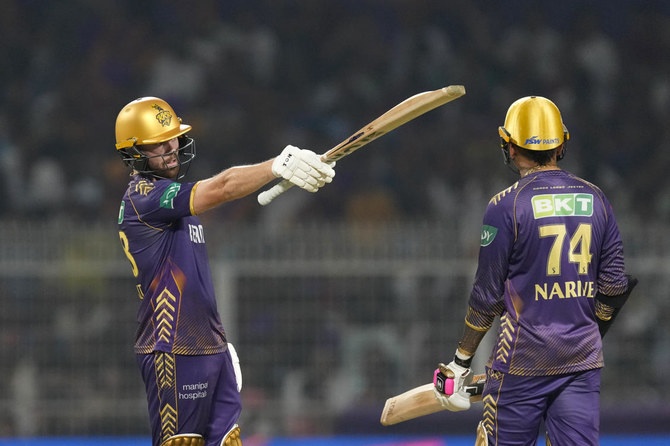
- Chakravarthy, a mystery spinner, led Kolkata’s disciplined bowling to restrict Delhi to 153-9
- Iin-form Salt, an England wicketkeeper-batsman, led the chase with an opening stand of 79 with Sunil Narine
KOLKATA: Phil Salt’s attacking 68 and bowling figures of 3-16 by Varun Chakravarthy helped Kolkata Knight Riders hammer Delhi Capitals by seven wickets at a hot and humid Eden Gardens in the IPL on Monday.
Chakravarthy, a mystery spinner, led Kolkata’s disciplined bowling to restrict Delhi to 153-9 as players, who remained drenched in sweat, and fans braved the intense heat in the colonial-era capital.
Players from all the 10 IPL teams are keen to impress their national selectors with just one day left for countries to name their teams for the T20 World Cup in June.
The in-form Salt, an England wicketkeeper-batsman, led the chase with an opening stand of 79 with Sunil Narine and the two-time champions reached their target with 3.3 overs to spare.
“It is high-risk but it is also about putting the odds in your favor and not taking the risks you don’t want to,” Salt said of his attacking game.
“You just have to keep backing yourself and keep taking the right options.”
The mercury in the afternoon soared above 41 degrees Celsius (106 degrees Fahrenheit) for the third time this month, forcing the normally bustling streets to stay empty at noon.
But the sports-mad city witnessed a near-packed house at the 66,000 capacity stadium for the evening game and their home team did not disappoint with their sixth win in nine matches to move closer to booking a play-off spot.
Most of India’s eastern states and southern peninsula have remained under government heatwave alerts since last week, with relief not expected for several more days.
Delhi elected to bat first but lost regular wickets including Prithvi Shaw for 13 and fellow opener Jake Fraser-McGurk, out for 12 off let-arm quick Mitchell Starc.
Skipper Rishabh Pant attempted to resist the slide in his unconvincing knock of 27 before he was dismissed by man of the Chakravarthy.
Chakravarthy rattled the middle and lower-order to make Delhi slip to 111-8 before number nine Kuldeep Yadav claimed an unbeaten 35.
“I think that (batting first) was a good option but as a batting unit, we did not bat well enough. 150 was definitely below par,” said Pant.
“That is part and parcel of cricket. We have a long break ahead, where we can learn from our mistakes.”
Salt, who moved into the top five batsmen this IPL season with 392 runs, put the chase on track along with fellow opener Narine as the two clobbered 23 runs off the first over from Lizaad Williams.
He reached his fourth half-century of the season in 26 balls with a six off Khaleel Ahmed but fell to spinner Axar Patel after his 33-ball knock laced with seven fours and five sixes.
Skipper Shreyas Iyer, who made 33, and Venkatesh Iyer, who hit the winning six in his 23, steered the team home in an unbeaten stand of 57.
The match was a complete contrast to the previous game at the venue when Punjab Kings chased down an IPL record of 262 on another hot day.
England’s Jacks makes case for T20 World Cup inclusion with IPL ton for Bengaluru as Chennai win
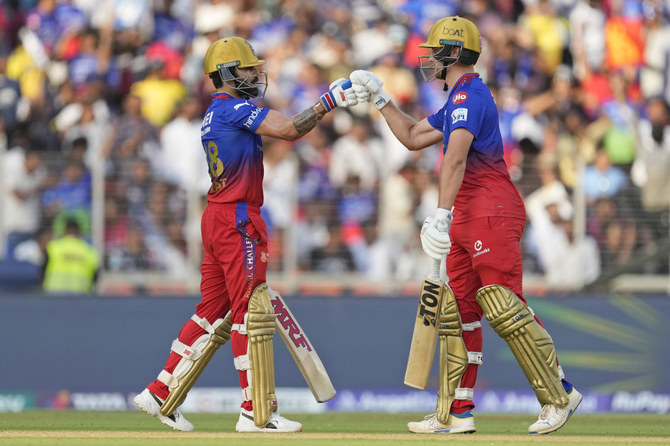
- Jacks chalked up 10 sixes in his blitz as he put on an unbeaten stand of 166 with Virat Kohli
AHMEDABAD: England’s Will Jacks on Sunday served a timely reminder for his inclusion in the T20 World Cup with a match-winning 41-ball 100 for IPL team Royal Challengers Bengaluru.
Jacks chalked up 10 sixes in his blitz as he put on an unbeaten stand of 166 with Virat Kohli, who hit 70.
Bengaluru chased down their victory target of 201 against Gujarat Titans with four overs and nine wickets to spare as Jacks hit the winning six, which also brought up his century.
In the second match of the day, skipper Ruturaj Gaikwad hit 98 to help holders Chennai Super Kings jump to third in the table with a 78-run hammering of Sunrisers Hyderabad.
The innings from Jacks and Gaikwad came just two days ahead of the International Cricket Council deadline of May 1 to announce teams for the T20 World Cup in June.
Bengaluru got their third win — and second in a row — in 10 matches so far this season, keeping their slim hopes of reaching the play-offs alive.
Jacks was on 16 when the in-form Kohli reached his fifty in 32 balls with a four off Rashid Khan, but soon the 25-year-old Englishman smashed three sixes and two fours in a 29-run 15th over from Mohit Sharma.
“Phenomenal. Initially when he came to bat, he was annoyed that he wasn’t able to strike the ball as he wanted to,” Kohli said after the win.
“The only talk was for him to stay calm; we know how explosive he can be when he gets going. The over from Mohit was the game changer, I was just happy to stay around and watch him go.”
Jacks then took on Rashid with four sixes and a four in the winning over.
The 35-year-old Kohli, who hit the first ton of this edition, reached 500 runs and was quick to slam critics who said the veteran batsman has struggled to meet modern T20 standards of power hitting.
“There’s a reason why you do it for 15 years. For me, it’s only about doing the work. People can talk anything they want to, they can talk about me not able to push on, not playing spin well, but you yourself know the game better,” Kohli said.
Kohli — who played the spinners with aplomb, including by using the sweep shot to good effect — and Bengaluru are still waiting for their first IPL title.
Bengaluru, who remain bottom of the 10-team table, elected to field first and Gujarat reached 200-3 in their 20 overs.
Sai Sudharsan hit an unbeaten 84 and put on key partnerships, including putting together 86 runs with Shahrukh Khan, who hit 58, and an unbeaten 69-run stand with David Miller, who made 26.
Glenn Maxwell returned to the Bengaluru line-up after a short “mental and physical break” of three matches, taking a wicket in his first over to return figures of 1-28 with his off-spin.
In match two, Chennai posted 212-3 courtesy of Gaikwad’s 54-ball knock and his key partnerships including a 107-run second-wicket stand with Daryl Mitchell, who hit 52.
Medium-pace bowler Tushar Deshpande led the bowling charge with four wickets as he helped bowl out Hyderabad for 134 in 18.5 overs.
Fraser-McGurk shines as Delhi down Mumbai in IPL, Rajasthan near play-offs
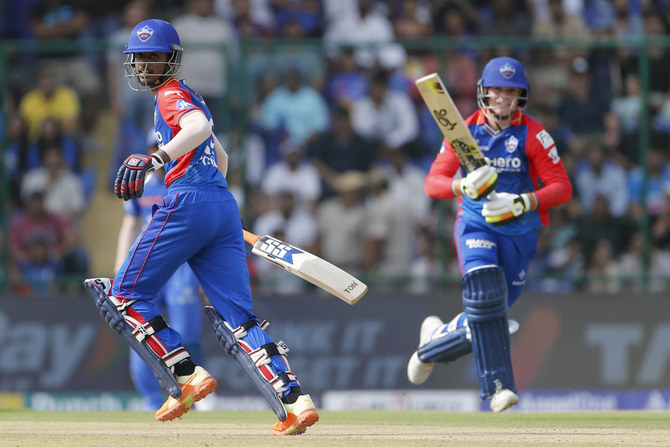
- Top four teams in the IPL table will qualify for the play-offs
NEW DELHI: Australia’s Jake Fraser-McGurk smashed 84 off 27 deliveries to fire Delhi Capitals to 257-4 and a 10-run win over Mumbai Indians in another IPL high-scorer on Saturday.
In the second match of the day, skipper Sanju Samson hit an unbeaten 71 as Rajasthan Royals all but confirmed their play-off spot with a seven-wicket hammering of Lucknow Super Giants.
Delhi, at their home Arun Jaitley Stadium, posted their best-ever total in the T20 tournament, a day after Punjab Kings chased down a record target of 262.
Delhi’s previous best was 231-4 in 2011 against Punjab Kings. This edition Sunrisers Hyderabad have twice smashed IPL records with totals of 277 and 287.
Bowlers kept five-time champions Mumbai down to 247-9 despite a valiant 32-ball 63 by Tilak Varma as Delhi boosted their play-off hopes with five wins in 10 matches.
Fraser-McGurk, a 22-year-old Australian batsman who has taken his IPL debut season by storm with three half-centuries in five matches, started with two fours and a six off England pace bowler Luke Wood in a 19-run first over.
“That’s my role, go out there and score as many as I can and get the team off to a nice start,” Fraser-McGurk, who has a strike-rate of 237.50, said after his blitz.
The Australian kept up the charge to reach his fifty in 15 balls with a hit over the fence and put on 114 runs with opening partner Abishek Porel, who hit 36.
Leg-spinner Piyush Chawla finally denied Fraser-McGurk, who went unsold in the auction before Delhi signed him as injury replacement, his century.
There was no stopping Delhi as Shai Hope hit a 17-ball 41, skipper Rishabh Pant made 29 off 19 deliveries and Tristan Stubbs smashed an unbeaten 48 to pummel the opposition attack.
Mumbai, who have endured a tough season after Hardik Pandya replaced veteran Rohit Sharma as captain and has been booed across a number of venues, lost regular wickets.
Pandya hit 46 off 16 balls but it was a 70-run partnership between Varma and Tim David, who hit 37 off 17 balls that raised Mumbai’s hopes, but Delhi kept calm.
David fell lbw to Mukesh Kumar after a four and a six and Varma was run out at the start of the final over as Mumbai remained ninth.
Kumar and fellow medium-pace bowler and impact substitute Rasikh Salam took three wickets each.
In the evening match in Lucknow, the hosts posted 196-5 courtesy a 76 by skipper KL Rahul and his 115 run stand with Deepak Hooda, who made 50.
Lucknow lost two early wickets after New Zealand’s left-arm quick Trent Boult bowled Quinton de Kock for eight and Sandeep Sharma bowled Marcus Stoinis for a duck.
Rahul and Hooda steadied the innings and then hit back but the effort was not enough as Dhruv Jurel, who hit 52, and Samson steered table-toppers Rajasthan home with one over to spare for their eighth win in nine matches.
Top four teams will qualify for the play-offs.
‘Ballistic’ Bairstow stars as Punjab pull off record T20 chase in IPL win over Kolkata Knight Riders
‘Ballistic’ Bairstow stars as Punjab pull off record T20 chase in IPL win over Kolkata Knight Riders

- Previous highest run chase in T20 history was scripted by South Africa who overhauled 258-5 made by the West Indies in 2023
- Shashank Singh also impressed with the bat, making 68 not out off 28 balls with eight sixes and two fours
KOLKATA: Jonny Bairstow smashed a “ballistic” unbeaten century as Punjab Kings recorded the highest successful run chase in Twenty20 cricket with an eight-wicket thrashing of Kolkata Knight Riders in the Indian Premier League on Friday.
The England star clobbered nine sixes and eight fours in his 48-ball 108 to help Punjab overhaul Kolkata’s 261-6 with eight balls to spare in hot and humid conditions at the Eden Gardens.
“We got off to a good start and that was key. They got off to a flier themselves so we knew we had to go ballistic in the powerplay,” said Bairstow, named player of the match.
“When you’ve to chase 200-plus you’ve to take risks in the powerplay. Try and whack it as hard as possible.”
Shashank Singh also impressed with the bat, making 68 not out off 28 balls with eight sixes and two fours.
The previous highest run chase in T20 history was scripted by South Africa who overhauled 258-5 made by the West Indies in 2023.
“Shashank has done it all season, a lovely guy and special player. To have someone like him coming in and do that is unbelievable,” added Bairstow.
The match also saw the batsmen club 42 sixes — the most ever hit in a T20 game.
“Cricket has turned to baseball hasn’t it?” said Punjab captain Sam Curran.
“Guys can hit balls for long periods of time, the coaches, training, the dew, dot balls become wide after reviews and you get the extra ball. Stats are going out of the window.”
He added: “Really pleased for Jonny, he’s been on tour for a long time and was eager to score. Shashank, he was promoted to number four, he’s been our find of the season.”
Kolkata skipper Shreyas Iyer said his team will learn from the defeat.
“Both teams played tremendously. You have to go back to the drawing board and see where you went wrong,” said Iyer.
“Not defending hurts but it’s a great lesson for the players.”
Punjab registered only their third win from nine games and moved to eighth spot in the 10-team competition.
Kolkata, with five wins from eight games, remain in second place.
“From the dugout, I was watching the wicket. I felt the ball was coming on with good bounce,’ said Shashank.
“This match, the way Jonny batted was a huge positive. It was a great learning for me, we still have five more matches to go.”
Opening the Punjab innings, Bairstow put on 93 runs with impact sub Prabhsimran Singh (54) and another 85 runs with South Africa’s Rilee Rossouw (26).
Prabhsimran was run out by a direct throw from Sunil Narine who also chipped in with the wicket of Rossouw in the 13th over.
Despite the two dismissals, Shashank continued to unleash big shots, making sure Punjab did not lose their nerve while chasing the big total.
Earlier, Kolkata got off to a blistering start with Phil Salt and Narine sharing 138 runs off just 69 balls for the first wicket after being put in to bat.
Narine, dropped on 16, hammered four sixes and nine fours in his 32-ball 71 before holing out to Bairstow off leg spinner Rahul Chahar.
England’s Curran dismissed Salt who hit a 37-ball 75 studded with six sixes and six fours after being dropped twice by sloppy Punjab fielders.
Venkatesh Iyer chipped in with a cameo 39-run knock as Kolkata posted the highest IPL total ever at the Eden Gardens.



